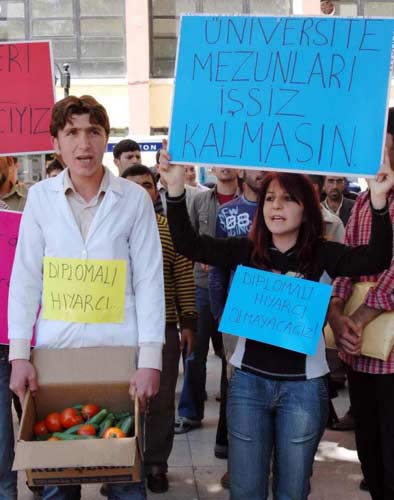Youth of Turkey: Are Turkish Youngsters Too Smart?

Young Turkish graduates struggle to find employment in their fields of study. The unemployment rate for Turks between the ages of 15 and 24 stands at 18.6 percent – nearly double the average in Turkey.
Istanbul / NationalTurk – A great story by Justin Vela from EurasiaNet Turkey
To get a sense of the scope of Turkey’s youth unemployment problem, you don’t have to look much further than downtown Istanbul’s inexpensive cafes, which are invariably jammed with 20-somethings during working hours. The country’s challenge isn’t simply one of creating more jobs to handle the rising tide of young people entering the work force, it’s also a matter of creating quality positions that can meet the heightened expectations of job-seekers.

Setting the stage for the unemployment conundrum is the demographic fact that more than half of Turkey’s estimated population of 75 million people is under the age of 30. And not only are there more youngsters seeking employment, they tend to be better educated than their elders.
Over the past decade, many 20-somethings in Turkey have become the first members of their respective families to attend university or other institutions of higher learning. Over the same period, the country has experienced robust economic growth — 8.2 percent in 2010, and averaging 6 percent annually from 2002-2008. But the growing economy hasn’t been able to create jobs fast enough to handle the increasing number of youths entering the labor force. That has left many newly minted graduates unable to find a job to match their skills.
Turkey grows so does unemployment too
Turkey’s official overall unemployment rate stands at 9.6 percent. But the rate nearly doubles to 18.6 percent for Turks between the ages of 15 and 24. The unemployment rate is partly a reflection of a surge in the number of Turks graduating from universities, medical and vocational schools each year — up 155 percent since 2000 to 573,159 in 2010.

“There are too many young people,” commented Ilayda Karakas, a 24-year-old who moved from the western city of Bursa to Istanbul in search of a job as a graphic designer. “There are too many universities. Too many people looking for the same job.”
Unable to find jobs in their fields of specialty, many young Turks instead fall back on low-paid positions in fast-food chains or temporary work, most of which is unofficial or part of the country’s massive grey economy.
After a fruitless two-year job hunt, 27-year-old Zeynep Yıldırım, who graduated from an Istanbul university in 2009 with a degree in computer engineering, ended up working in her family’s grocery store in the Aegean resort town of Bodrum. “I feel horrible, terrible, of course,” she said. “Day by day, I am going to forget what I learned.”
Ümit Efendioglu, director of the International Labor Organization’s Ankara office, identified a lack of adequate job-market preparation among Turkish institutes of higher education as a contributing factor in Turkey’s youth unemployment problem. Technical and creative-thinking skills remain in short supply, particularly among graduates of vocational schools, she said. “There is a disconnect with industry and the private sector,” Efendioglu said. “The labor supply does not match the demand” for employees with highly specialized post-secondary degrees to work in scientific and technical sectors that require solid R&D or management skills.
Turkey Youth ‘ Battle of Unemployment

Structural problems in Turkey’s labor market also play a role, commented economic consultant Emre Deliveli, a columnist for Hürriyet Daily News. The need to pay high severance packages – one month’s salary for each year of work – to former workers means that turnover at Turkish companies is not robust. Those who do hire do not always recognize diplomas from vocational schools, from which 231,601 Turks graduated in 2010, nearly a 200-percent increase from a decade ago. The preference is to keep entry-level salaries low or, in many cases, off the books.
“Young people are avoided or hired informally,” noted Dr. Seyfettin Gürsel, an economist at Istanbul’s Bahçeşehir University. Students who attended prestigious universities in Istanbul or Ankara sometimes are more likely to get jobs simply because Turkish companies like to show off highly accredited employees, added Deliveli.
Reflecting on her own six-month job search, 25-year-old Rabia Özkutlu, a recent graduate of Istanbul’s Beykent University with a degree in business management, said that her salary expectations — a monthly salary of 1,500 liras (about $836 as of the middle of November 2011) — was a stumbling block. Most potential employers only wanted to pay new employees a maximum of 1,200 liras (about $678) per month for full-time employment, she added. “We are used to the money our parents give us,” she said. “We cannot live [as accustomed] on this salary. If [employers] don’t agree with you, they say, ‘Next!’”
The Ministry of Labor and Social Security declined to comment about its ideas for improving the employment situation for young job seekers.

The ILO’s Efendioglu said that, as an incentive to hire young people, the government has given companies a five-percentage-point reduction in the amount of money they must pay each year for retirement and healthcare benefits for employees aged between 18 and 29 years old. The Turkish Employment Agency also is currently carrying out a “provincial market needs assessment” to determine labor supply trends in different locations around the country, she added.
So far, the issue of youth unemployment has not resonated politically. Among Turkey’s mainstream opposition parties, interest tends to gravitate more toward issues with regular news coverage, such as constitutional reform. Young people, meanwhile, haven’t been very politically active of late. For example, youth turnout was low at a scantily attended Occupy Istanbul event staged in early November.
Given the circumstances, as well as the potential for an economic downturn, more and more young people seem to be revising their expectations. Twenty-five-year-old, multilingual Ozge Akkaya graduated this year with a history and English degree from Istanbul’s prestigious Boğaziçi University, and accepts that she might not find work in her fields of choice. Instead, she is translating a book from Italian to Turkish. The job is unofficial, but “I can’t say I am unemployed,” she said.
[adrotate banner=”33″]

